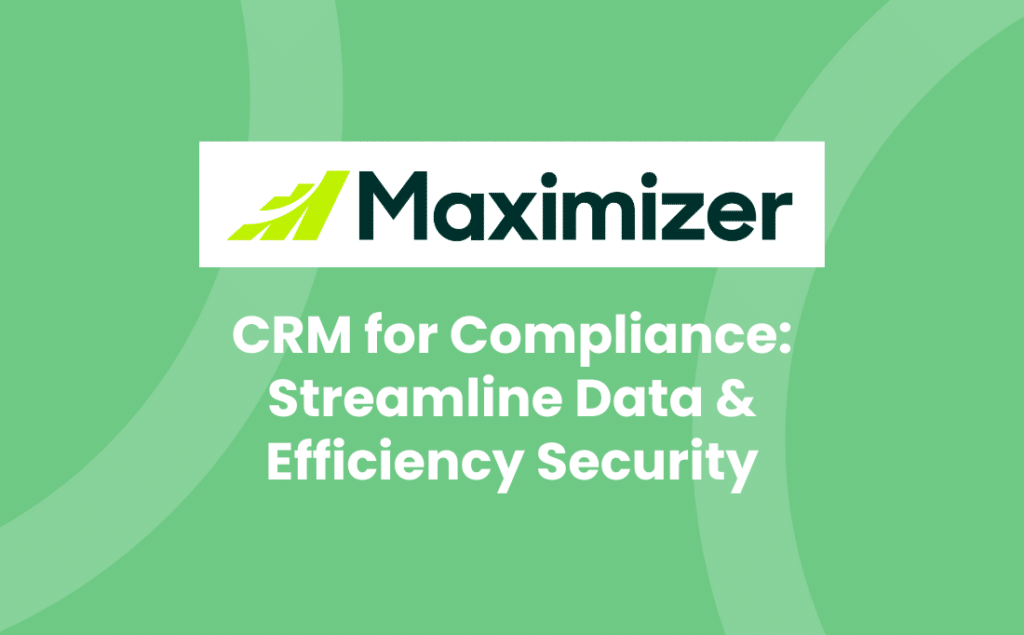Exploring the complex world of regulatory compliance can feel like a challenging job. Yet, with the right Customer Relationship Management (CRM) system, you can simplify and streamline this process. CRM tools aren’t just about managing customer interactions; they play a crucial role in ensuring your business stays compliant with ever-changing regulations.
Imagine having a centralised hub where all your compliance-related data is meticulously organised and easily accessible. A robust CRM system offers exactly that, helping you maintain accurate records, track essential compliance activities, and generate reports with ease. By leveraging CRM technology, you reduce the risk of non-compliance and free up valuable time to focus on what truly matters—growing your business.
Key Takeaways
- Streamlined Compliance Management: CRM systems like Maximizer centralise compliance-related data, making it easier to manage and access critical information.
- Enhanced Document Control: Features such as robust document control and audit trails simplify the process of maintaining accurate records and demonstrating compliance during audits.
- Regulatory Framework Support: CRM systems aid in meeting various regulatory requirements, including GDPR, by providing secure data management and role-based access controls.
- Automated Workflows: Automated workflows within CRM systems ensure standardised processes and timely compliance alerts, reducing the risk of non-compliance.
- Data Security Measures: Implementing role-based access controls (RBAC) and encryption enhances data security, aligns with privacy laws, and protects sensitive information.
Understanding CRM and Its Importance in Business
Customer Relationship Management (CRM) systems have transformed how businesses manage interactions, streamline processes, and ensure compliance.
What Is CRM?
CRM stands for Customer Relationship Management. It refers to software solutions that help organisations manage customer data, track interactions, and automate various sales, marketing, and customer service functions. Maximizer CRM is a comprehensive platform tailored for the manufacturing industry, offering tools to enhance customer engagement and ensure regulatory compliance.
Why Is CRM Integral to Business Operations?
CRM systems are critical for several reasons:
- Data Centralisation: They provide a unified database where all customer information is stored. This ensures data consistency and accessibility across departments.
- Process Automation: By automating routine tasks like follow-ups and reporting, CRMs improve efficiency. This allows teams to focus on strategic activities rather than administrative work.
- Enhanced Customer Engagement: CRMs help track customer interactions across multiple channels. For instance, Maximizer’s customisable dashboards enable you to monitor processes effectively.
- Regulatory Compliance: With features like audit trails and secure data storage, CRMs support adherence to industry regulations. Avrion’s digital transformation services use Maximizer CRM to help manufacturers stay compliant with as they evolve.
For more information on how Avrion can assist with implementing Maximizer CRM for your manufacturing business, visit Avrion’s Solutions.
How CRM Helps in Regulatory Compliance
CRM systems play a crucial role in ensuring regulatory compliance, especially for the manufacturing industry. By leveraging Maximizer CRM through Avrion’s digital transformation services, you can streamline various aspects of compliance management.
Streamlining Data Management and Accessibility
Maximizer CRM centralises customer data, making it easier to manage and access critical information. You can store customer interactions, transaction histories, and compliance-related documents in one place. This unified approach reduces the risk of data silos and ensures that all relevant information is readily available when needed. For example, if an audit occurs, you can quickly retrieve the required documents without sifting through multiple systems.
Enhancing Document Control and Audit Trails
Maintaining accurate records is essential for regulatory compliance. Maximizer CRM offers robust document control features that help you manage versions and ensure consistency. You can track changes made to documents over time, creating a clear audit trail. This functionality simplifies the process of demonstrating compliance during audits or inspections. Also, automated workflows within Maximizer CRM ensure that documents are reviewed and approved systematically, reducing the likelihood of human error.
By integrating these features into your operations with Avrion’s expertise, you enhance your ability to meet regulatory requirements efficiently.
The Role of CRM in Different Regulatory Frameworks
Maximizer CRM, coupled with Avrion’s digital transformation services, enhances regulatory compliance across various frameworks. It addresses the unique requirements of different industries by providing robust data management and documentation capabilities. Our case studies exemplify this.
GDPR Compliance
General Data Protection Regulation (GDPR) mandates stringent data protection measures for EU citizens. Maximizer CRM ensures that your customer data is centralised and secure, complying with GDPR requirements. By using Maximizer CRM, you can manage consent records, carry out data access controls, and ensure timely responses to data access requests. Audit trails within the CRM offer a transparent view of data handling processes.
Key Features of CRM That Aid in Compliance
Maximizer CRM, supported by Avrion’s digital transformation services, offers several key features that ensure regulatory compliance in the manufacturing industry.
Automated Workflows and Compliance Alerts
Automated workflows in Maximizer CRM streamline compliance-related tasks. These workflows standardise processes, ensuring every action aligns with regulatory standards. Compliance alerts notify you of any deviations or upcoming deadlines, reducing the risk of non-compliance. For example, GDPR mandates timely responses to data access requests; automated alerts ensure you meet these requirements promptly.
Role-Based Access Controls
Role-based access controls (RBAC) in Maximizer CRM restrict data access based on user roles. This feature limits exposure to sensitive information, aligning with regulations like GDPR. Only authorised personnel can view or modify specific data, enhancing data security. For instance, only HR staff might access employee records while sales teams see customer interaction logs.
Utilising these features within Avrion’s digital transformation framework ensures your manufacturing operations remain compliant with evolving regulations.
Implementing CRM for Compliance
Implementing CRM for compliance ensures your manufacturing operations meet regulatory standards. Leveraging Maximizer CRM within Avrion’s digital transformation services streamlines this process.
Steps to Integrate Compliance into CRM Systems
- Assess Regulatory Requirements: Identify relevant regulations like GDPR that impact your industry. This helps in configuring the CRM to meet specific compliance needs.
- Customise Workflows: Set up automated workflows in Maximizer CRM to standardise processes and ensure consistent adherence to regulations.
- Enable Compliance Alerts: Configure alerts to notify users of upcoming deadlines or deviations, reducing the risk of non-compliance.
- Carry out Role-Based Access Controls (RBAC): Restrict data access based on user roles to enhance data security and comply with privacy laws.
- Centralise Documentation: Use Maximizer CRM to store all compliance-related documents in a central repository, simplifying document control and audit trails.
- Data Management Issues: Ensuring accurate and complete data can be challenging. Use Maximizer CRM’s centralised database for real-time updates and accuracy.
- User Adoption Resistance: Employees may resist new systems. Provide training through Avrion’s services to ease transition and encourage adoption.
- Complex Regulations: Keeping up with changing regulations is tough. Customisable features in Maximizer CRM allow quick updates to compliance protocols.
- Audit Preparation: Preparing for audits is time-consuming. Utilise automated report generation in Maximizer CRM to streamline this process.
- Security Concerns: Data breaches can lead to non-compliance. Carry out encryption within Maximizer CRM for enhanced security.
By following these steps and addressing common challenges, integrating compliance into your CRM system becomes manageable, ensuring your manufacturing operations remain compliant with evolving standards.
For more information on how Avrion’s digital transformation services can help you carry out Maximizer CRM, visit Avrion Solutions.
Conclusion
Maximizer CRM, combined with Avrion’s digital transformation services, offers a robust solution for regulatory compliance in manufacturing. By centralising customer data and streamlining data management, you can ensure your operations stay aligned with stringent regulations like GDPR. Features such as automated workflows, compliance alerts, and role-based access controls standardise processes while enhancing data security. Integrating these elements into your CRM system helps address challenges in data management, user adoption, and audit preparation, ensuring your business remains compliant amid evolving standards.
Frequently Asked Questions
What is Maximizer CRM?
Maximizer CRM is a customer relationship management software that helps businesses centralise and manage customer data, streamline processes, and maintain compliance with regulatory standards like GDPR.
How does Maximizer CRM help with regulatory compliance?
Maximizer CRM aids regulatory compliance by centralising customer data, providing audit trails, and offering features like automated workflows, compliance alerts, and role-based access controls to ensure secure and standardised data management.
What are the key features of Maximizer CRM for compliance?
Key features include automated workflows to standardise processes, compliance alerts to notify users of regulatory requirements, role-based access controls for enhanced security, and comprehensive audit trails to track data handling.
How can Avrion’s digital transformation services assist manufacturing companies?
Avrion’s digital transformation services help manufacturing companies integrate compliance into their CRM systems by assessing regulatory requirements, customising workflows, enabling alerts, implementing role-based access controls, and centralising documentation.
Why is centralising customer data important for compliance?
Centralising customer data ensures that all information is stored in one place, making it easier to manage, monitor, and protect against breaches. This centralisation supports efficient auditing and adherence to regulations.
What challenges do manufacturing companies face in maintaining compliance?
Challenges include managing vast amounts of data, ensuring user adoption of new systems, staying updated with changing regulations, preparing for audits effectively, and addressing security concerns comprehensively.
How do automated workflows in Maximizer CRM benefit regulatory compliance?
Automated workflows ensure that processes are consistently followed according to regulatory standards. They reduce human error and improve efficiency by automating routine tasks related to compliance requirements.
What are role-based access controls in Maximizer CRM?
Role-based access controls restrict system access based on user roles within the organisation. This ensures that sensitive information is only accessible to authorised personnel, enhancing security and aiding in compliance.


